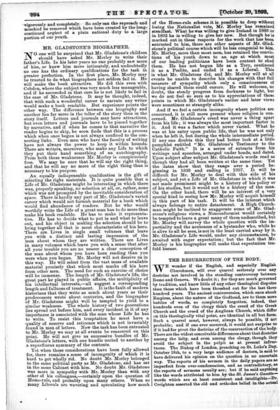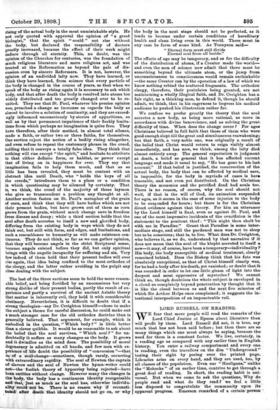THE RESURRECTION OF THE BODY.
WE wonder if the English, and especially English Churchmen, will ever quarrel seriously over any doctrine not involved in the standing controversy between Rome and Geneva. We doubt it; for they are much governed by tradition, and know little of any other theological disputes than those which have been threshed out for the last three hundred years. The ancient controversies, which once shook Empires, about the nature of the Godhead, are to them mere battles of words, so completely forgotten, indeed, that hundreds even of the clergy think the creed of the Greek Church and the creed of the Anglican Church, which differ on this theologically vital point, are identical in all but form. Such a quarrel must, however, always be possible, if not probable; and if one ever occurred, it would not surprise us if it had for pivot the doctrine of the resurrection of the body. There are the widest conceivable differences about that doctrine among the laity, and even among the clergy, though they avoid the subject in the pulpit as at present infra°. tuous. The Bishop of London, preaching on St. Luke's Day, October 18th, to a very large audience of doctors, is said to have delivered his opinion on the question in no uncertain way. The reports of his sermon in the daily papers are as imperfect from over-condensation, and as contradictory, as the reports of sermons usually are; but if he said anything like the words attributed to him by the St. James's Gazette words which are at least consistent and intelligible—Dr. Creighton asserted the old and orthodox belief in the actual rising of the actual body in the most unmistakable style. He not only quoted with approval the opinion of "a great biologist," that the spirit " could " not rise without the body, but declared the responsibility of doctors greatly increased, because the effect of their work might endure through all eternity. This, no doubt, was the opinion of the Churches for centuries, was the foundation of much religious literature and more religious art, and was treated at the Reformation as beyond the pale of dis- cussion even by sincere Reformers. It is not, however, the opinion of an undivided laity now. They have learned, or think they have learned, from science that every particle of the body is changed in the course of years, so that when we speak of the body as rising again it is necessary to ask which body, and that after death the body is resolved into atoms too widely distributed and too greatly changed ever to be re- united. They see that St. Paul, whatever his precise opinion was, preached a change so immense as regards the body as almost to involve a solution of continuity, and they are exceed- ugly influenced unconsciously by stories of apparitions, as well as by that permanent impatience of their fleshly limita- tions from which perhaps no imagination is quite free. They have therefore, after their method, in almost total silence, made a faith, or rather two or three faiths, for themselves. One section reject the notion of a bodily rising altogether, and even refuse to repeat the customary phrase in the creed, holding that it conveys a totally false idea. They think that nothing will rise except "the spirit," and hesitate to attribute to that either definite form, or habitat, or power except that of living on in happiness for ever. They say that imagination fails to help them much, and that as so little has been revealed, they must be content with an abstract idea until Death, who " holds the keys of all the creeds," introduces them to a place or a condition in which questioning may be silenced by certainty. That is, we think, the creed of the majority of those laymen who give so transcendent a problem any thought at all. Another section fasten on St. Paul's metaphor of the grain of corn, and think that they will have bodies which are not their present bodies, but have grown out of them as corn grows from the grain, without much change save in freedom from disease and decay ; while a third section holds that the soul after death accretes to itself a new and glorified body, differing from the existing body in ways which they do not think out, but still with form, and edges, and limitations, and such a resemblance to humanity as will make existence con- tinuous. They do not think, so far as we can gather opinion, that they will become angels in the strict Scriptural sense, because angels existed before they did, but only spiritual beings with the angelic incapacity for suffering and sin. Very few indeed of them hold that their present bodies will ever rise again, that idea being confined to the most orthodox of the clergy, and the latter rather avoiding in the pulpit any close dealing with the subject.
The last of the three sections seem to hold the more reason. able belief, and being fortified by an unconscious but very strong dislike of their present bodies, partly the result of ex- perience and partly a survival of the ancient Asiatic theory that matter is inherently evil, they hold it with considerable obstinacy. Nevertheless, it is difficult to doubt that if a strong theologian—say Dr. Creighton himself—chose to make the subject a theme for careful discussion, he could make out a much stronger case for the old orthodox doctrine than is generally believed. That argument, for example, which is embodied in the question, "Which body ? " is little better than a clever quibble. It would be as reasonable to ask about the belief that the soul survives, " Which soul P" for un- doubtedly it suffers as many changes as the body. It grows and it dwindles as the mind does. The possibility of moral degeneracy is admitted on all hands, and few men with ex- perience of life doubt the possibility of " conversion "—that. is,' of a soul-change—sometimes, though rarely, occurring with extraordinary rapidity. The soul of Newton the captain of slavers and the soul of Newton the hymn-writer could not—the foolish theory of hypocrisy being rejected—have been entities without change. However many the changes in the body, the body has a, continuous identity recognisable and' real, just as much as the soul has, otherwise individu- ality could not be. There is no reason why if reconsti- tntecr after death that identity should not go on, or why
the body in the next stage should not be perfected, as it tends to become under certain conditions of hereditary health and clean living even in this world. There must in any case be form of some kind. As Tennyson said-
" Eternal form must still divide
Eternal soul from all beside."
The effects of age may be temporary, and as for the difficulty of the distribution of atoms, if a Creator made the world— and even the men of science now admit that there must be something beyond the ultimate atom, or the jump from unconsciousness to consciousness would remain unthinkable —the same Creator can by the operation of a law of which we know nothing rebind the scattered fragments. The orthodox clergy, therefore, their postulates being granted, are not maintaining a wholly illogical faith, and Dr. Creighton has a. fair right, as a thinking man, to defend it, though he should admit, we think, that in his eagerness to impress his medical audience he pushed his illustration rather far.
We confess we prefer greatly the theory that the soul accretes a new body, as being more rational, as more in accordance with divine benevolence, and as solving the great difficulty of time. When does the change occur ? For ages Christians believed in full faith that those of them who were good enough slept till the great and simultaneous reawakening; but that faith, a very noble one, was originally a result of the belief that Christ would return to reign visibly almost immediately, and has now, we think, among the laity died almost entirely away. The general expectation is judgment at death, a belief so general that it has affected current language and made it usual to say, "He has gone to his last account." If that belief is justified, the resurrection of the actual body, the body that can be affected by medical stare, is impossible, for the body in myriads of cases is hero traceable, and not even yet distributed. On the Christian theory the mummies and the petrified dead had souls too. There is no reason, of course, why the soul should not wait, if that is the will of God, its animation suspended for ages, as it seems in the case of some injuries to the body to be suspended for hours ; but there is for the Christian direct evidence against that theory. For him an utterance by the Lord himself is final, even as against St. Paul, and one of the most impressive incidents of the crucifixion is the statement to the penitent thief : " This night thou shalt be with me in Paradise." Grant that Paradise is some inter- mediate stage, and still the pardoned man was not to sleep but to be conscious; that is, to live. What does Dr. Creighton, who believes it, as we do, understand by that narrative if it does not mean that the soul of the klepht accreted to itself a new—it may, of course, have been a temporary—individuality P His body, the body susceptible of medical treatment, clearly remained behind. Does the Bishop think that his fate was absolutely exceptional, as that of Christ himself clearly was, for he had a body after his death, yet vanished ; or doubt that was recorded in order to let one little gleam of light into the- deepest and most oppressive of mysteries ? We cannot think so, though doubtless the whole subject is enveloped in a cloud so completely beyond penetration by thought that it is like the cloud between us and the next five minutes of which Sir Arthur Helps once complained; it suggests the in- tentional interposition of an impenetrable veil.







































 Previous page
Previous page